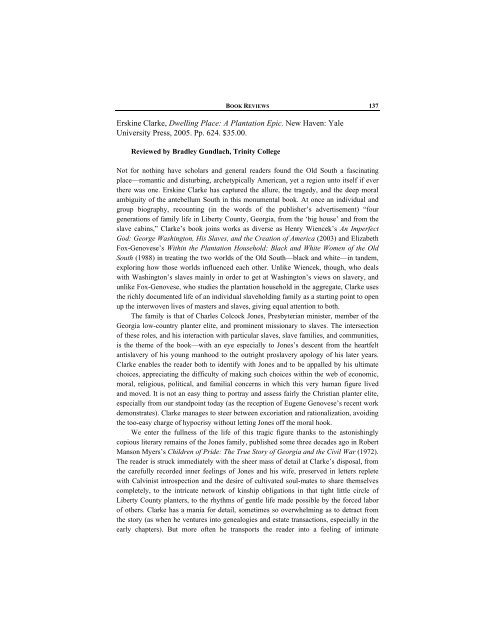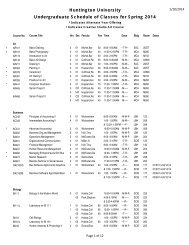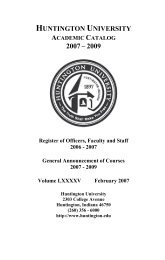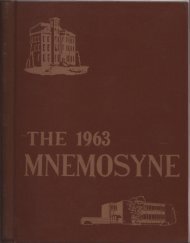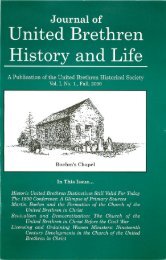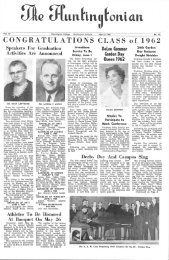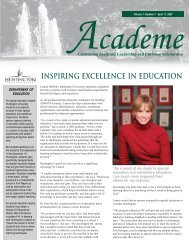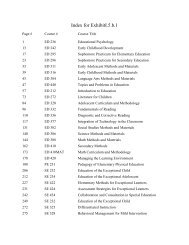Gillian Clark, Christianity and Roman Society - Huntington University
Gillian Clark, Christianity and Roman Society - Huntington University
Gillian Clark, Christianity and Roman Society - Huntington University
Create successful ePaper yourself
Turn your PDF publications into a flip-book with our unique Google optimized e-Paper software.
BOOK REVIEWS 137<br />
Erskine <strong>Clark</strong>e, Dwelling Place: A Plantation Epic. New Haven: Yale<br />
<strong>University</strong> Press, 2005. Pp. 624. $35.00.<br />
Reviewed by Bradley Gundlach, Trinity College<br />
Not for nothing have scholars <strong>and</strong> general readers found the Old South a fascinating<br />
place—romantic <strong>and</strong> disturbing, archetypically American, yet a region unto itself if ever<br />
there was one. Erskine <strong>Clark</strong>e has captured the allure, the tragedy, <strong>and</strong> the deep moral<br />
ambiguity of the antebellum South in this monumental book. At once an individual <strong>and</strong><br />
group biography, recounting (in the words of the publisher’s advertisement) “four<br />
generations of family life in Liberty County, Georgia, from the ‘big house’ <strong>and</strong> from the<br />
slave cabins,” <strong>Clark</strong>e’s book joins works as diverse as Henry Wiencek’s An Imperfect<br />
God: George Washington, His Slaves, <strong>and</strong> the Creation of America (2003) <strong>and</strong> Elizabeth<br />
Fox-Genovese’s Within the Plantation Household: Black <strong>and</strong> White Women of the Old<br />
South (1988) in treating the two worlds of the Old South—black <strong>and</strong> white—in t<strong>and</strong>em,<br />
exploring how those worlds influenced each other. Unlike Wiencek, though, who deals<br />
with Washington’s slaves mainly in order to get at Washington’s views on slavery, <strong>and</strong><br />
unlike Fox-Genovese, who studies the plantation household in the aggregate, <strong>Clark</strong>e uses<br />
the richly documented life of an individual slaveholding family as a starting point to open<br />
up the interwoven lives of masters <strong>and</strong> slaves, giving equal attention to both.<br />
The family is that of Charles Colcock Jones, Presbyterian minister, member of the<br />
Georgia low-country planter elite, <strong>and</strong> prominent missionary to slaves. The intersection<br />
of these roles, <strong>and</strong> his interaction with particular slaves, slave families, <strong>and</strong> communities,<br />
is the theme of the book—with an eye especially to Jones’s descent from the heartfelt<br />
antislavery of his young manhood to the outright proslavery apology of his later years.<br />
<strong>Clark</strong>e enables the reader both to identify with Jones <strong>and</strong> to be appalled by his ultimate<br />
choices, appreciating the difficulty of making such choices within the web of economic,<br />
moral, religious, political, <strong>and</strong> familial concerns in which this very human figure lived<br />
<strong>and</strong> moved. It is not an easy thing to portray <strong>and</strong> assess fairly the Christian planter elite,<br />
especially from our st<strong>and</strong>point today (as the reception of Eugene Genovese’s recent work<br />
demonstrates). <strong>Clark</strong>e manages to steer between excoriation <strong>and</strong> rationalization, avoiding<br />
the too-easy charge of hypocrisy without letting Jones off the moral hook.<br />
We enter the fullness of the life of this tragic figure thanks to the astonishingly<br />
copious literary remains of the Jones family, published some three decades ago in Robert<br />
Manson Myers’s Children of Pride: The True Story of Georgia <strong>and</strong> the Civil War (1972).<br />
The reader is struck immediately with the sheer mass of detail at <strong>Clark</strong>e’s disposal, from<br />
the carefully recorded inner feelings of Jones <strong>and</strong> his wife, preserved in letters replete<br />
with Calvinist introspection <strong>and</strong> the desire of cultivated soul-mates to share themselves<br />
completely, to the intricate network of kinship obligations in that tight little circle of<br />
Liberty County planters, to the rhythms of gentle life made possible by the forced labor<br />
of others. <strong>Clark</strong>e has a mania for detail, sometimes so overwhelming as to detract from<br />
the story (as when he ventures into genealogies <strong>and</strong> estate transactions, especially in the<br />
early chapters). But more often he transports the reader into a feeling of intimate


